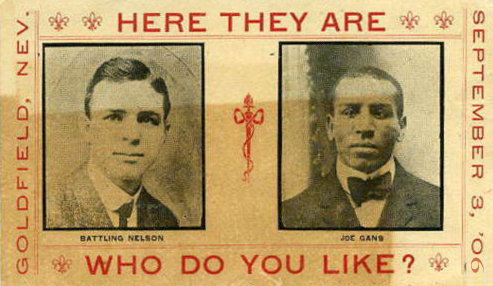
Baltimore boxer Joe Gans
From The Boston Globe a Book Review of "‘The Longest Fight’ by William Gildea," by Globe Correspondent, Bill Littlefield, on 19 July 2012 -- On a sweltering day in 1906, reigning champion Joe Gans went 42 rounds with Oscar “Battling” Nelson in Goldfield, Nev., a mining boomtown. The title fight was not scheduled for 42 rounds, but it had been agreed that it would continue until Gans or Nelson indicated that he could fight no more, either by so signaling, or by failing to stumble from his corner, or by falling down dead. It ended because the battered, nearly unrecognizable Nelson fouled his opponent so blatantly and so often that the referee had no choice but to award Gans the decision.

It was a remarkable feat of endurance, made more so by the fact that Gans likely had already been infected with tuberculosis.
The fight was such a popular attraction that mines for hundreds of miles around Goldfield were closed for the occasion. “[The mines] had never been closed before, not even on Sundays,” wrote William Gildea in “The Longest Fight: In the Ring With Joe Gans, Boxing’s First African-American Champion.’’
This marathon battle forms the centerpiece of Gildea’s biography of a forgotten champion who faced racial challenges at the turn of the 20th century that would presage those of a coming generation of athletic color-barrier breakers. The veteran Washington Post sportswriter serves up an extended account of the contest, weaving in biographical bits about Gans’s life and ending with a look at the aftermath of his victory and his death.
Gans was a gifted and hard-working fighter whose devotion to his craft lent credibility to those who would call his profession “the sweet science.” Because Joe Gans was a lightweight rather than a heavyweight, and because he was relatively discreet regarding his romantic pursuits outside the ring, his name has not lived in history — or infamy — as Jack Johnson’s has. But Gildea makes a strong case for Gans as the pride of Black America before Johnson threw a punch.
The bout in which he defeated the Danish-American Nelson, who liked to promote himself by saying, “I ain’t human,’’ went “two hours and forty-eight minutes, the longest championship fight of the twentieth century.” Though he’d been a champion for four years before the bloodbath in Goldfield, beating Nelson “made Gans prominent in a way no other black athlete had been.”
In fact, while the fight attracted no shortage of fans who shouted racial epithets throughout the match, the popularity of Gans was such that Young Corbett, a white boxer of considerable merit and renown, maintained that “after this fight, people will forget Gans is a black man.”
Because this is boxing we’re talking about, the career of Joe Gans could not end well. Though sick with the tuberculosis that would kill him shortly thereafter, Gans fought Nelson a second time a couple of years later and lost. Two days after a beating Gildea likened to torture, Gans agreed to a rubber match a few months later.
Like prizefighters now, prizefighters then resisted retiring gracefully, and the reasons were the same. In Gans’s case, the reasons numbered 30,000: the purse Tex Rickard offered for a third fight. As Gildea writes, Gans’s deteriorating condition didn’t matter to Rickard. No matter that the second fight had been lopsided and gruesome. It had made money.
Nelson knocked out Gans in the 21st round. Afterward “Nelson declared that he would never fight ‘a colored man’ again — none was worthy of him.’’
The death of Gans in 1910 inspired “the largest funeral procession for a black’’ in the history of his hometown of Baltimore. Four horse-drawn carriages were followed by three large wagons covered in flowers. People from the worlds of show business and sports gathered to pay their respects to the champion who’d achieved a significance that his success as a boxer could not entirely explain.
And as Gildea points out, what Gans had accomplished would live on within his sport as well. In the years and decades following the champion’s death, promoters trotted out Cyclone Joe Gans, Baby Joe Gans, Allentown Joe Gans, and at least 64 other boxers who’d appropriated his name or had it appropriated for them. (source: The Boston Globe)





Hi, i think that i saw you visited my site thus i came to
ReplyDelete“return the favor”.I'm attempting to find things to enhance my site!I suppose its ok to use some of your ideas!!
Feel free to visit my blog ... http://www.yourtobaccosstore.com/
Excellent article! Keep up the good work.
ReplyDelete